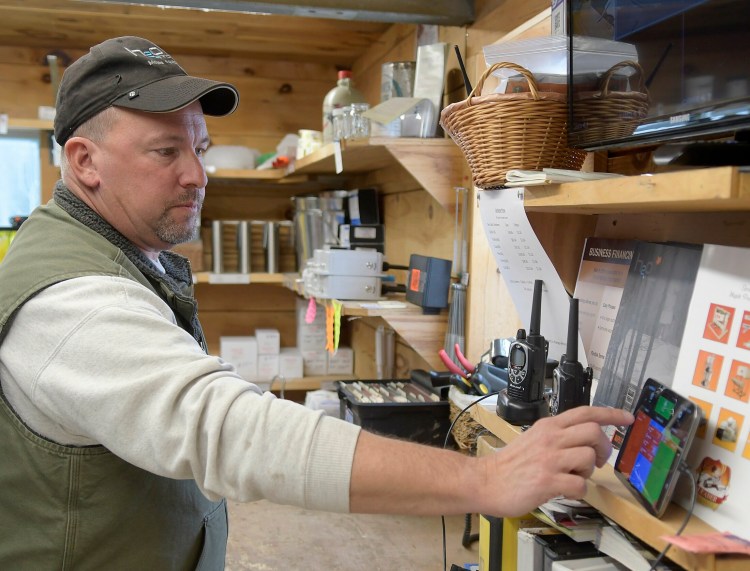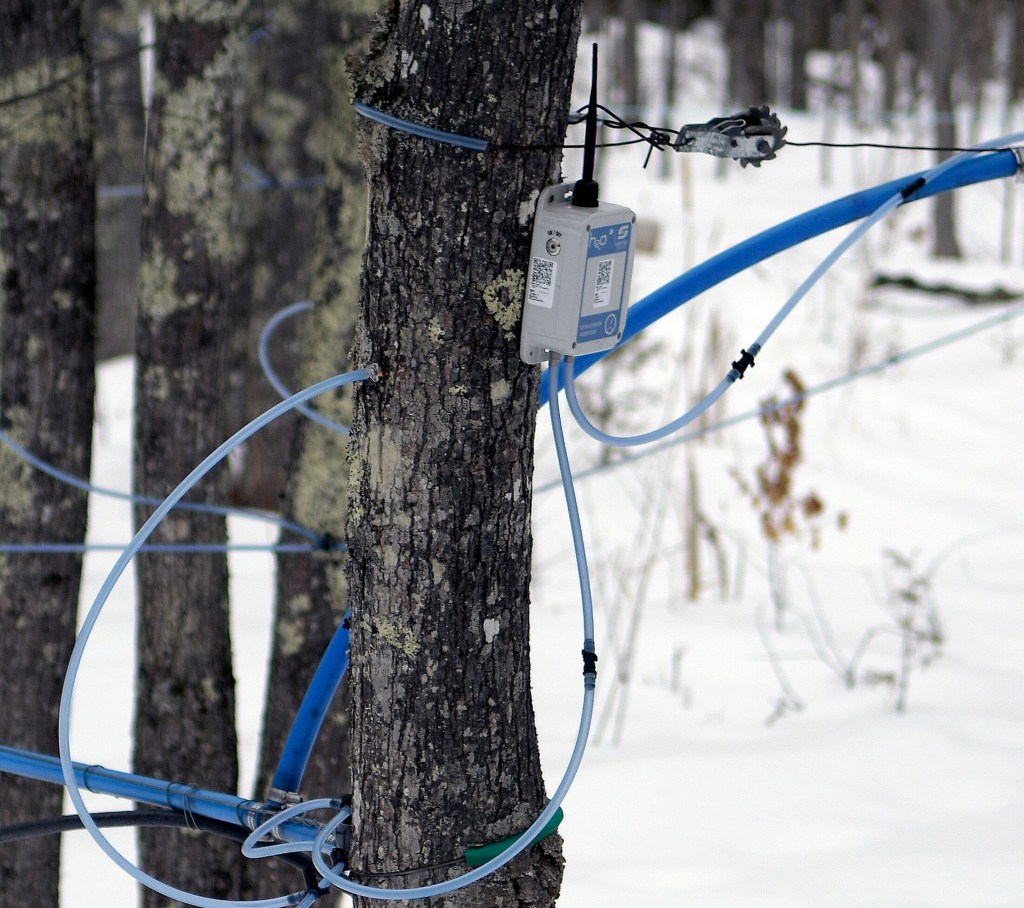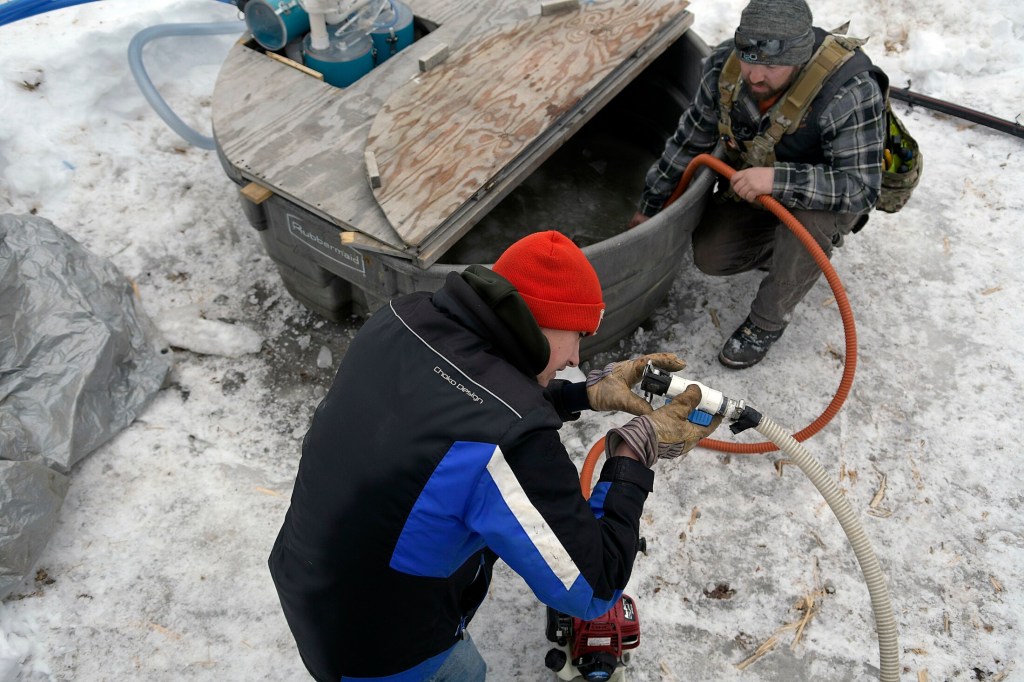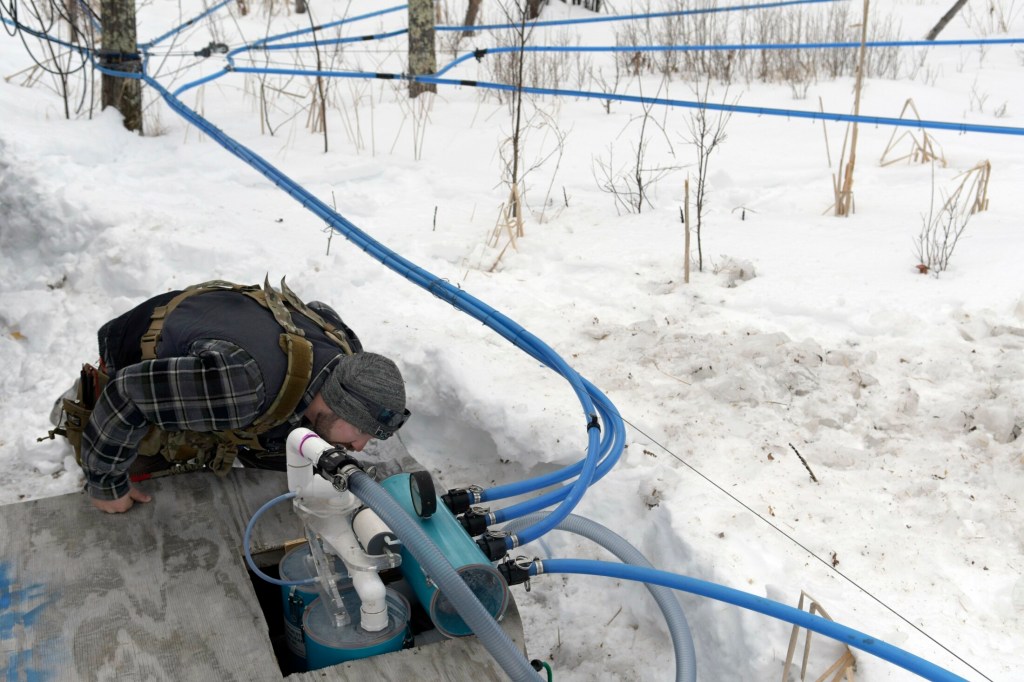SIDNEY — Kevin and Shelley Bacon, owners of Bacon Farm Maple Products, have taps to collect sap in 4,000 maple trees connected by miles-long webs of tubing.
They have an employee who walks their groves of trees every day making sure things are running smoothly. They have high technology equipment, including sensors placed in the woods, which detect the temperature and any leaks in the system and send radio signals from the groves to the sugarhouse where the Bacons can see that and other data on their cell phones and computers. And they have a six-generation family history of producing maple syrup on their Sidney farmland, since 1881.
What they don’t have is much of a clue what the maple season has in store this year. They’ve got their taps in place, but the sap isn’t running much yet.
That’s up to the weather, over the coming days and nights.
“It’s a crapshoot,” Kevin Bacon said of how good the maple sap, and thus syrup, production will be this season. “It’s not something you can really predict.”
The ideal conditions for maple production, which really get the sap moving, are freezing nights and warmer days with temperatures around 40 degrees.
“If we have warm days, in the 40s or so, and it’s cold at night, we should have many good sap days,” said Kathy Hopkins, extension educator for the University of Maine Cooperative Extension. “Looking at the weather forecast, next week looks like there should be some good sap run days. I think most people will begin (getting sap) next week. It all depends on getting favorable weather between now and early April.”
Last year was a banner year at the Bacon Farm, where they churned out sap to make syrup, a wide range of other maple products and wholesale distribution from February 27 to the third week of April.
“We boiled sap last year to the point we didn’t really want to do it anymore,” Kevin Bacon said while chatting about the business in the sugarhouse of their family farm at the intersection of Pond and Goodhue roads in Sidney, with his wife Shelley, their son and worker Nathan and employee Tyler Jepson.
They put their taps in a couple of weeks ago, but so far the sap hasn’t been moving much.
Hopkins said that’s pretty typical of what she’s hearing from other Maine maple producers so far this season. She said the hard-packed snow and ice in the woods is making it more difficult for some to get out into the woods to tap their trees. She said a few producers in southern Maine have already made some syrup this season, but not much.
“This year has been pretty slow so far, compared to the last few years, because we have had so much snow and cold weather,” she said. “Some, especially in Aroostook County and even some in Kennebec County, have had to dig out their lines because they were covered in snow. But it’s March, so people will be out tapping, if they’re not already completely tapped. They’ll be out in the woods.”
Maple producers will be joined at their sugarhouses by thousands of visitors March 24 for Maine Maple Sunday, when numerous sap operations open their doors for tours, demonstrations, samples and other activities. Hopkins said it’s the event’s 36th year.
She said there seem to be an increasing number of people collecting and boiling maple sap as a hobby, though how many is hard to tell as hobbyists don’t need a license.
Bacon Farm Maple Products — in addition to selling maple products ranging from traditional syrup and sugar candy to maple wine made by Tree Spirits in Oakland and Pittston-made Chadwick’s Maple Craft Spirits — also sells taps, tubing and evaporators and the same sensors and other aids they use in their sap operations. They also install equipment in the sugar bushes of other sap operations, for a fee, and can monitor their equipment remotely, via the internet.
Jepson said having them setup a system saves other producers from having to invest in the gear it takes to install out in the woods and brings the expertise gleaned on the farm Kevin and Shelley have run since 2000, where the Bacon family has farmed and collected sap since 1881.
“We’re tapping some trees my grandfather tapped and my great-grandfather tapped,” Kevin Bacon said.
The miles of tubing that collect sap from trees and bring it to collection tubs in the woods, which are pumped into portable tanks to be hauled to the sugarhouse, must be carefully placed so they flow downhill toward the collection points.
Jepson and Nathan Bacon, while out checking on the system Sunday, said pumps create a vacuum in the lines, which pulls the sap through the tubing but won’t pull it uphill. They use a sighting device to determine the grade of a grove then set up tubing by line of sight. A 2 percent grade, Jepson said, is ideal.
Someone walks the groves each morning, checking on lines and listening for a hissing sound indicating a leak, often caused by trees or branches falling on tubing or from wild animals biting through it.
The Bacons also broker syrup for other producers, taking in 55 gallon drums of the sweet stuff and reselling it in bulk in the wholesale market.
But it’s still not enough to be able to predict just what this sap season will be like. That’s up to Mother Nature.
“It’s agriculture, like making hay,” Shelley Bacon said. “It all depends on the weather.”
Keith Edwards — 621-5647
kedwards@centralmaine.com
Twitter: @kedwardskj
Send questions/comments to the editors.







Success. Please wait for the page to reload. If the page does not reload within 5 seconds, please refresh the page.
Enter your email and password to access comments.
Hi, to comment on stories you must . This profile is in addition to your subscription and website login.
Already have a commenting profile? .
Invalid username/password.
Please check your email to confirm and complete your registration.
Only subscribers are eligible to post comments. Please subscribe or login first for digital access. Here’s why.
Use the form below to reset your password. When you've submitted your account email, we will send an email with a reset code.